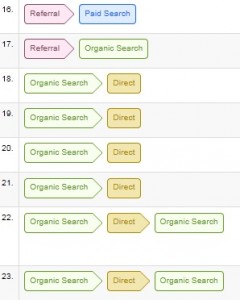| Apr 20, 2012
The Challenge of Properly Valuing Search Marketing Services
At Elliance, we are extremely proud of the work we do on behalf of our search clients on a daily basis. We help improve their rankings, visibility, and brand awareness through a customized variety of search marketing services. But, it’s sometimes very difficult to value that visibility we’re providing, both for our clients and for our own internal marketing efforts.
Even at its most basic level, valuation of search has been lacking. Most conversion reports of the past attributed new prospects or customers to either the first or last touch point. However, we’ve learned over the years that as searchers progress through the decision funnel, they tend to move from more general, non-branded terms like “digital marketing agency” to branded phrases like “Elliance Pittsburgh.” It’s unlikely someone would search on a very general term, navigate to our website, and immediately convert. Similarly, we’ve seen that once a brand or website is found in search results and becomes a part of the searcher’s consideration set, that person tends to come directly to the site on subsequent visits, as opposed to using a search engine. That’s where the value demonstration can fall short.
According to research recently released by Slingshot SEO, organic search is, at times, undervalued by as much as 77%. That bears repeating. Organic search can be undervalued by up to 77%. And, as a result, direct traffic is being grossly overvalued. That’s disturbing to any search marketing team that’s hungry for validation.
Last week, I had an eye-opening meeting with our analytics specialist. He presented some of the newer Google Analytics reporting capabilities that he thought we – as a search team – would be interested in seeing and utilizing. He was right. I was interested.
One particular report caught my attention. When you’ve set up conversion goals in your analytics account, you’ll see a ‘Multi-Channel Funnels > Top Conversion Paths’ report. It just might change everything you thought you knew about valuing your search campaigns.
What this report provides is, quite simply, a view of the entire digital path a prospect took before completing a conversion on your site. This path contains every interaction that prospect had with your site, whether he/she came from referral sources, search campaigns, social sites, or any other custom campaign you might be tracking. Not only that. It also provides some context around that path: the search terms associated with all organic and paid searches, identification of which referral and/or social networking sites, etc.
This example from our own analytics report sheds some light on what used to be lost information. Conversions that end in a direct visit now can be viewed as having had important assists from the organic campaign. And, conversions that ended on a branded organic search can be accurately valued as having begun on a more general term. Validation.
This isn’t a brand new idea for our team. In fact, we created a similar report on our own many years ago on behalf of one of our clients. We all wanted better tracking on the traffic and conversions coming in from the search terms we’d optimized, so we made it happen. We could see the entire organic path of touch points: which search terms were used on which engines. But, what we implemented had its limitations. The tracking code was being run on a site neither the client nor we managed, so we had a number of instances of data loss. Plus, we were only tracking one dimension of the conversion path: organic search.
The Conversion Paths report in Google Analytics is a more sophisticated version of what we created years ago, and to a search marketer, this report is priceless. Organic and paid searches now have a fighting chance to be viewed as critical components of the conversion path. Not only does this insight help value past work, it can also help shape future strategies.
Realistically, even this report doesn’t give us a full picture of search marketing’s value. Can you put a price tag on the thousands of times your brand is displayed in Google News search results through a well-optimized press release? Can you assign a value to all the impressions your site’s top search result receives…even when it wasn’t clicked? Can you calculate the ROI on a Google+ profile or post that’s properly optimized for search engines? Probably not. But, even though so many elements of search remain untrackable, slowly but surely, it feels like we’re getting somewhere.

